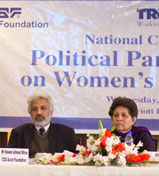
31-01-2013
Islamabad
National Consultation on Women’s Empowerment in Political Parties’ Election Manifestos
Aurat Foundation, in collaboration with Parliamentarians Commission for Human Rights (PCHR), organized a National Consultation on Women’s Empowerment in Political Parties’ Election Manifestos, on Wednesday, 30 January in Islamabad. The main objective of the consultation was to dialogue with Political Party representatives to incorporate the Handbook recommendations into their Manifestos.
Aurat Foundation launched the Handbook titled ‘Suggestions on Women’s Empowerment for Election Manifestos of Political Parties’ co-authored by Naheed Aziz and Tahira Abdullah, development practitioners and rights activists. Riaz Fatyana, Chairperson, National Assembly Standing Committee on Human Rights, chaired the event; Naeem Mirza, Chief Operating Officer Aurat Foundation, was the Co-Chair.
Ch. Shafique from the Parliamentarians Commission for Human Rights (PCHR) coordinated the event. Mr Naeem Mirza, Chief Operating Officer Aurat Foundation, welcomed the members of political parties in the national consultation. He said that usually gender is a social construction, but we women and human rights activists at Aurat Foundation have learned that gender is a ‘political construction’.
Naheed Aziz, in her presentation, pointed out the rationale for mainstreaming girls’ and women’s concerns in the Election Manifestos in all interventions focusing on major policies, plans and macro-economic structures and social sectors; the need to increase budgets for women-focused in initiatives, especially in health and education sector; the terminology used should be explicit, and should clearly indicate sex/age and sub-group differentiation; and that there should be no gap in understanding between those who prepare manifestos for their political parties, and those who implement those manifestos. She also emphasized the need for consistency across each Manifesto, ensuring that statements in one part should not negate or dilute the others. There should be very clear inter- and intra-sectoral linkages. She specified the indicators demonstrating a Party’s commitment to democratic development, particularly in the gender perspective.
Tahira Abdullah demanded an end to paternalistic benevolence, patriarchal, feudal and religio-political structures impeding women’s empowerment, particularly political participation; and an end to perceiving reserved seats, quotas and affirmative action for women as charitable handouts; this is necessary to level the uneven playing field. She advocated that political parties should allocate tickets for women to contest elections directly on general seats, as democracy should not be about ‘electability’ and ‘winnability’, but it is all about inclusion and fairplay; and women’s participation is the result of their long struggle for political, legal and socio-economic rights. She emphasized the need for a fresh census, and demanded that the census should not be termed ‘mardum shumari’ but ‘insaan-shumaari” or ‘fard-shumaari” as the census is not only the counting of men and boys, but also women and girls. She emphasized the need to focus on the ‘feminization of poverty’, unemployment, health, girls’ education, and the rising tide of Talibanization, jihadism, extremism and terrorism.
Senator Mir Hasil Khan Bizenjo (National Party), in his remarks agreed that the manifestos of political parties do need a lot of addition and improvement. Dr Ishaque Baloch, from National Party, Balochistan, in his remarks said that his party and leaders believe that women’s active political participation is must for a strong democratic system. Ms Anisa Zeb Tahirkheli, from Qaumi Watan Party, Balochistan, appreciated the timing of the consultation as most of the political parties are in process of writing / re-writing their manifestos. She said that her party is against any type of discrimination against women and believes in enhancing women’s participation in politics and governance. Ms Mehnaz Rafi, from Pakistan Tahrik-e-Insaf, in her remarks said that most of the political parties ignore the issues of women’s rights at the most crucial times. For example, all the political parties gave cold response to the popular demand of repealing of Hudood Ordinances.
Ms Farah Aqil, Senator from ANP, while talking about the women’s presence in political parties, agreed that although the situation is not very good in her own party, but leaders of her party believe in bringing more women in the parties and in the parliaments. Ms Khushbakht Shujaat, MNA from MQM, in her remarks said that her party fully agrees with most of the suggestions as proposed by Aurat Foundation in the booklet. She also said that one of the major reason behind discrimination against women is the ‘neem-mulaet’ (so-called religious-ism) as whenever there is a talk of women’s rights, religious leaders bring in the religion. Ms Nuzhat Sadiq, Senator from PML-N, in her remarks said that there is a need to collect more data on situations of women in health, education, economic, employment and all other sectors. She said that her party has recently worked a lot on women’s right to inheritance.
Mir Khursheed Jamal Deeni, from Balochistan National Party (BNP) in his remarks said that violence and terrorism, continued since the times of General Musharaff, has drastically affected women’s rights in Balochistan. Mr Anwar Soomro, General Secretary of Awami Tahrik, Sindh, said that his party, under the leadership of Rasool Bux Palijo, was the first party to establish a political party for Sindhi women, called Sindhianni Tahreek. He also demanded that instead of 17% or 33% quota for women in the parliaments, there shall be 50% quota for women on reserved seats. Mr Enwar Baig, Senator from PML-N, in his remarks emphasized that political parties and governments in Pakistan shall collectively increase the budget in education and health sector and also increase women’s education and opportunities in employment.
Chair of the consultation Mr Riaz Fatyana, Chairperson, Standing Committee on Human Rights, in his concluding remarks, while appreciating the participation of all the representatives from various political parties, said there is a need to change the common mindset of feeling shame in bringing women out in politics, education and employment. While emphasizing on women’s economic empowerment, he said that the political parties shall ensure increase in women’s quota in employment more than 10%. |

